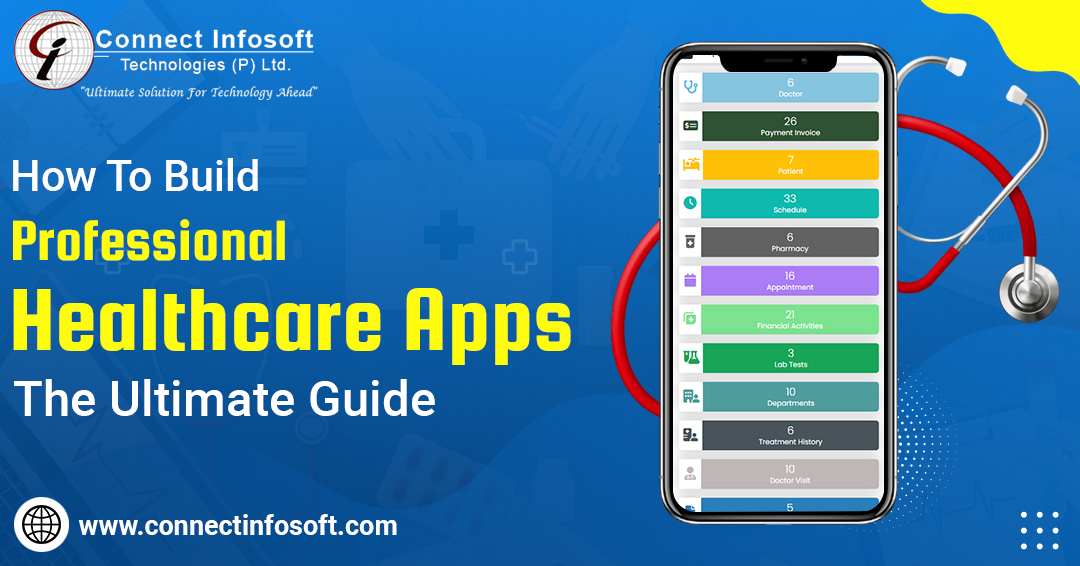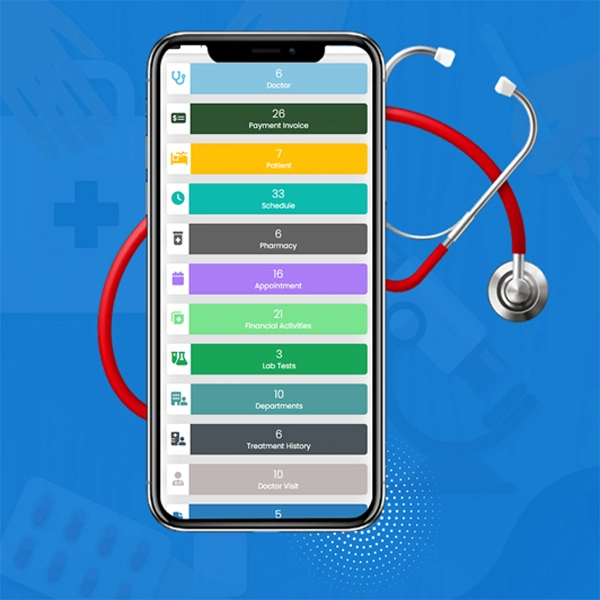How to Build Professional Healthcare Apps: The Ultimate Guide | Connect Infosoft

In today's digital age, healthcare apps have become essential tools for both patients and healthcare providers. These apps provide convenient access to medical information, enable remote consultations, facilitate appointment scheduling, and offer various other features that enhance the overall healthcare experience. If you're considering building a professional healthcare app,
This ultimate guide will walk you through the key steps and considerations involved in the development process.
1. Define Your App's Purpose and Target Audience:
Before you dive into app development, it's crucial to clearly define the purpose of your healthcare app and identify your target audience. Determine the specific healthcare needs or challenges your app will address, such as medication management, telemedicine, fitness tracking, or chronic disease management. Understanding your target audience's demographics, preferences, and technological proficiency will help you tailor the app's features and design to meet their needs effectively.
2. Conduct Thorough Market Research:
Comprehensive market research is essential to gain insights into existing healthcare apps, identify gaps or opportunities, and understand user expectations. Analyze competitor apps to assess their strengths, weaknesses, and user feedback. Identify trends, industry regulations, and compliance standards for healthcare app development, such as HIPAA in the United States or GDPR in Europe. This research will guide your app's unique value proposition and ensure compliance with relevant healthcare regulations.
3. Collaborate with Healthcare Professionals:
Engaging healthcare professionals early in the development process is critical for building a professional healthcare app. Involve physicians, nurses, or other relevant specialists to ensure that your app aligns with clinical best practices, patient safety standards, and the healthcare workflow. Their expertise will help you design features that are user-friendly, accurate, and clinically relevant, ultimately enhancing the app's credibility and usefulness.
4. Plan and Design User Experience (UX) and User Interface (UI):
Creating a seamless and intuitive user experience is paramount for healthcare apps. Begin by creating wireframes and prototypes to visualize the app's flow and functionality. Aim for a clean and user-friendly interface that focuses on simplicity and ease of navigation. Consider factors such as font size, color schemes, and contrast to ensure accessibility for all users. Prioritize features that enhance usability, such as appointment scheduling, secure messaging, or personalized health data visualization.
5. Secure Data Privacy and Compliance:
Healthcare apps deal with sensitive user data, making data privacy and regulatory compliance crucial considerations. Implement robust security measures to protect users' personal health information. Ensure compliance with relevant privacy laws and regulations, such as HIPAA, by adopting encryption protocols, user authentication, and secure data storage. Conduct regular security audits and penetration testing to identify and address any vulnerabilities proactively.
6. Choose the Right Technology Stack:
Selecting the appropriate technology stack for your healthcare app is essential for its performance, scalability, and future maintenance. Consider factors such as platform compatibility (iOS, Android, or cross-platform), programming languages (Swift, Kotlin, JavaScript), and frameworks (React Native, Flutter). Keep in mind the scalability requirements, as your app may need to handle increased user loads over time.
7. Develop and Test:
The development phase involves coding, integrating APIs, and building the app's backend infrastructure. Adopt an Agile development approach to ensure flexibility, adaptability, and regular feedback from stakeholders. Implement a robust testing strategy, including unit testing, integration testing, and user acceptance testing, to identify and fix any bugs or usability issues. Regularly iterate and refine the app based on user feedback and testing results.
8. Integrate Relevant APIs and Third-Party Services:
Leverage existing healthcare APIs and third-party services to enhance the functionality of your app. Integrate electronic health record (EHR) systems, appointment scheduling APIs, payment gateways, or health monitoring devices to provide a seamless experience for users. Ensure that the APIs and services you integrate are reliable, secure, and compliant with relevant healthcare standards.
9. Obtain Necessary Certifications and Approvals:
Depending on the country and the nature of your healthcare app, you may need to obtain certifications and approvals from regulatory bodies. These certifications, such as FDA approval for medical devices or CE marking in Europe, validate the safety and efficacy of your app. Familiarize yourself with the necessary requirements early in the development process to avoid delays or setbacks.
10. Launch, Monitor, and Iterate:
Once your healthcare app is developed, thoroughly tested, and compliant with regulations, it's time to launch it in the market. Implement analytics tools to monitor user engagement, app performance, and user feedback. Regularly collect and analyze data to identify areas for improvement, feature enhancements, or user experience optimization. Continuously iterate and release updates to address user needs and stay ahead of the competition.
Conclusion:
Building a professional healthcare app requires careful planning, collaboration with healthcare professionals, a user-centric design approach, robust data privacy measures, and adherence to regulatory standards. By following this ultimate guide, you can navigate the complexities of healthcare app development and create a secure, user-friendly, and impactful digital health solution. Remember to prioritize user experience, stay updated with the evolving healthcare landscape, and continuously iterate and improve your app to meet the changing needs of patients and healthcare providers. With dedication, expertise, and a deep understanding of the healthcare industry, your professional healthcare app has the potential to make a significant positive impact on the way healthcare is delivered and experienced.
